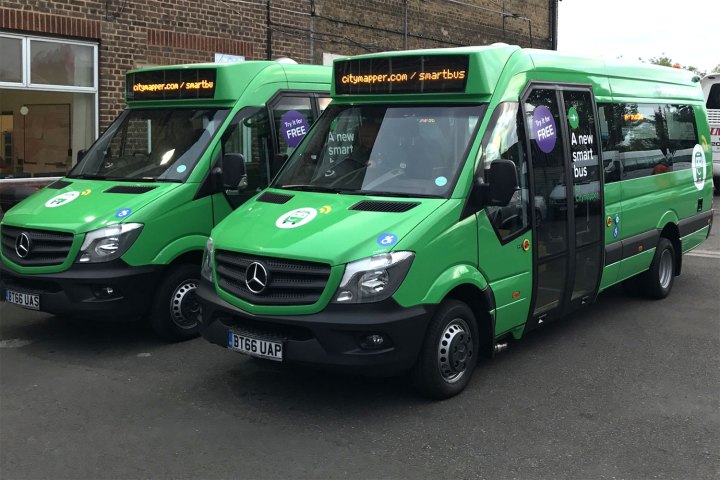
Citymapper is best known as a public transit app but last year the outfit expanded its horizons by starting a bus service using its own vehicles in London.
But nine months after launch, the company is ditching the effort and switching instead to a new service called Smart Ride.
Smart Ride launched on February 21 and is described by Omid Ashtari, Citymapper’s president and head of business, as “a bit like a bus because it has stops [and] a bit like a cab because you book it and it has guaranteed seats.”
Though the company described its bus service as a success, it had been frustrated by regulatory hurdles specific to the bus industry that made it hard to develop its service in the way that it wanted. Smart Ride gives it more freedom in terms of routes, though it will still stick to specific roads in the capital. The new service also allows it to respond more flexibly to demand.
It’s starting out with a fleet of eight-seater Mercedes Viano vehicles picking up passengers at designated stops in central London, though under the terms of its license it could operate up to 500 vehicles. Riders can request a lift via the Citymapper app before making their way to the nearest pickup point to share their journey with others.
“We believe in the future of shared transportation in cities, there is no way we’re going to solve for congestion and pollution otherwise,” Ashtari told the Guardian.
Bye-bye bus service
Citymapper invested a lot of time, effort, and money in its night-time bus service, creating a special app, tracking software, scheduling systems, and a bus kitted out with USB ports and smart displays. It tried to make the ride fun for passengers, pumping pop music through speakers and creating personal “busmojis” that alerted riders via the displays to their approaching stop.
In a blog post on February 20, the company said it had managed to run its service “at a fraction of the cost of what traditional bus systems do,” but that regulatory hurdles prevented its expansion.
Smart Ride, it believes, is the solution that suits it best.
“Carry 9+ people in London and you’re a bus and have to follow strict regulations on fixed routes, schedules, and service frequency,” the company said. “Carry 8 people or fewer, and you’re a private hire vehicle that can go wherever you want, however you want, how often you want.”
It added: “As a result, a private hire vehicle can respond to demand, a bus cannot. That makes it hard for a bus, even a smart green minibus, to be part of the ‘demand-responsive’ future.”
Taking on Uber
Regulator Transport for London (TfL) refused to grant a new license for Uber when it came up for renewal in September, 2017, citing a number of problems, including its approach to reporting serious criminal offenses to the police.
The ridesharing company can continue to operate until its appeal is heard in the spring, and this week it announced changes to its service that it says improves safety for both riders and drivers.
Citymapper’s Smart Ride seems most similar to Uber’s ExpressPool, a new service launched by the ridesharing giant this week in a number of U.S. cities that requires the rider to walk up to a couple of blocks to start their journey with others heading in the same direction.
Updated on February 21 with details of Citymapper’s Smart Ride service.
Editors' Recommendations
- Car2Go car-sharing service shutting down in the U.S. after reality check
- Recording rides won’t fix Uber’s assault problem, lawyers say, but it’s a start
- Uber is now arguing that it doesn’t actually have any drivers


